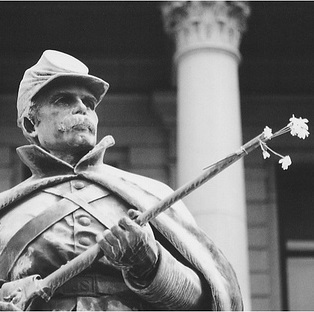“The true object of war is peace.”
This expression is often attributed to Sun Tzu, author of the ancient “Art of War.” In fact, it seems to have originated in the forward to the 1983 edition of that book, written by James Clavell – someone who is just as qualified to remark on the subject of war and peace.
Even if Sun Tzu did not say that war’s purpose was peace in so many words, he did express similar expressions. Many good military leaders did, and do, understand that war is not an undertaking that should be entered into without a goal of peace.
Certainly there are unjust wars. However violence itself is not the opposite of peace. Several times throughout human history war was fought in order to restore a peace that was lost. Oppression, denial of human rights, or outright aggression against a people or nation is not peaceful, even if it is nonviolent. And when all else has failed, violence has sometimes been necessary to restore peace.
Blessed are the peacemakers; but maintaining the status quo when there is not peace is not “keeping the peace,” it is staying silent in the face of evil.
Thankfully, most of us will not be in a position to decide whether or not to wage war against another country, and for that we should be grateful that we are spared that terrible responsibility.
Yet each of us fights a war every day in a different way. The world as we know it is not the Kingdom of Heaven for which we hope. Conflict surrounds us, and we cannot avoid it. We must, at times, speak out, take action, and be forceful at times to correct the wrongs around us. The eternal revolution is an ongoing fight we as Christians can never escape.
This does not mean we should go out swinging fists at every person with whom we disagree. Our words may sting or have bite. Our anger may justly rise up, our thoughts may turn to non-violent vengeance. Or we may be thrust into a conflict in which moral right must be defended.
In these cases the principle that “the true object of war is peace” still applies. Righteous or just anger must still seek peace. If it feeds itself into a festering rage, or inspires shaming or harm to a person, their reputation, or their livelihood beyond the measure necessary to right the wrong at hand, then it has overstepped the boundaries of justice.
We must maintain hope at all times. When it comes to personal conflict with other people, in our homes, in our workplace, and in the world around us, we must always keep our eyes on the goal of peace. Every word of correction, every thought in anger, every expression of justice must take form in a way that will preserve the dignity of all human persons. Especially the person with whom you are arguing.
In a way, overstepping the bounds of a righteous anger is to lose hope that other people want what is good. Unjust anger casts them as an enemy, when we are called to accept all people as neighbors and fellow children of God.
You may not wage war on a global scale, but make sure every little act of war you make in your daily life is a hopeful gesture towards peace.
Paul Nowak is a husband and father of 7, who also happens to be a writer and author. He has written The Way of the Christian Samurai among other books.

